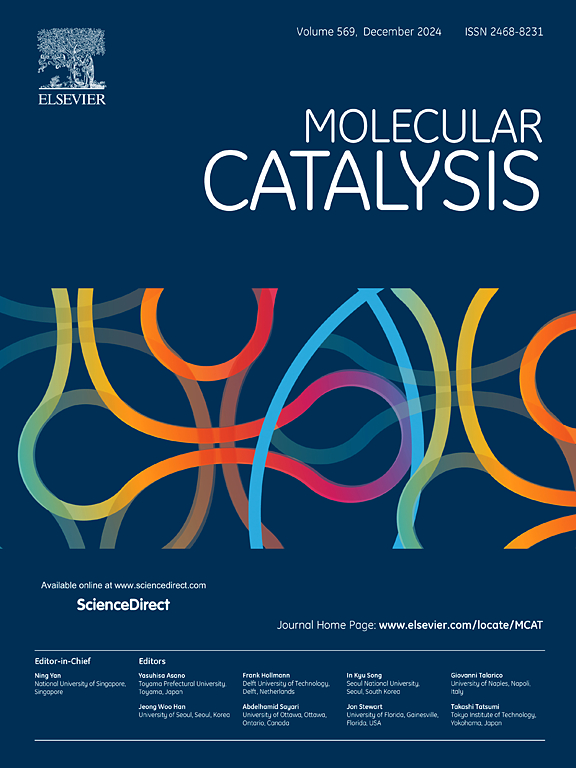Preparation of 30%PMoV2@MOF@mSiO2 (MOF = MIL-101, HKUST-1, UiO-67, ZIF-8) catalysts and their oxidative desulfurization performance
IF 4.9
2区 化学
Q2 CHEMISTRY, PHYSICAL
引用次数: 0
Abstract
PMoV2 was encapsulated in four MOFs (MIL-101, HKUST-1, UiO-67, ZIF-8) with different cavity sizes and window sizes using a hydrothermal synthesis method. Then, a layer of mesoporous silica was coated on the surface of the MOFs to obtain four designed three-layer encapsulated catalysts 30%PMoV2@MOF@mSiO2. The physicochemical properties of the catalysts were characterized through various characterization methods, and the influence of different MOF window sizes of the four catalysts on the removal rate of four thiophene sulfides was investigated. The optimal reaction conditions were also explored for the optimal catalyst. The results indicate that under simulated fuel of 2400 ppm, 30%PMoV2@UiO-67@mSiO2 owns the highest catalytic activity. Under optimal conditions, the total removal rate of four thiophene compounds was 91.52 %, and after ten cycles, the efficiency could still reach 86.24 %. This is attributed to the sufficient cavity size of UiO-67, which provides assurance for the loading of PMoV2 and the large window size, making it possible for the smooth reaction between sulfides and PMoV2.

30%PMoV2@MOF@mSiO2 (MOF = MIL-101、HKUST-1、UiO-67、ZIF-8)催化剂的制备及其氧化脱硫性能
采用水热合成法将 PMoV2 封装在四种具有不同空腔尺寸和窗口尺寸的 MOFs(MIL-101、HKUST-1、UiO-67 和 ZIF-8)中。然后,在 MOFs 表面包覆一层介孔二氧化硅,得到四种设计的三层包覆催化剂 30%PMoV2@MOF@mSiO2。通过各种表征方法对催化剂的理化性质进行了表征,并研究了四种催化剂不同的 MOF 窗口尺寸对四种噻吩硫化物去除率的影响。此外,还探讨了最佳催化剂的最佳反应条件。结果表明,在模拟燃料为 2400 ppm 的条件下,30%PMoV2@UiO-67@mSiO2 的催化活性最高。在最佳条件下,四种噻吩化合物的总去除率为 91.52%,经过十次循环后,效率仍可达 86.24%。这归功于 UiO-67 具有足够的空腔尺寸,为 PMoV2 的装填提供了保证,同时其窗口尺寸较大,使硫化物与 PMoV2 的反应得以顺利进行。
本文章由计算机程序翻译,如有差异,请以英文原文为准。
求助全文
约1分钟内获得全文
求助全文
来源期刊

Molecular Catalysis
Chemical Engineering-Process Chemistry and Technology
CiteScore
6.90
自引率
10.90%
发文量
700
审稿时长
40 days
期刊介绍:
Molecular Catalysis publishes full papers that are original, rigorous, and scholarly contributions examining the molecular and atomic aspects of catalytic activation and reaction mechanisms. The fields covered are:
Heterogeneous catalysis including immobilized molecular catalysts
Homogeneous catalysis including organocatalysis, organometallic catalysis and biocatalysis
Photo- and electrochemistry
Theoretical aspects of catalysis analyzed by computational methods
文献相关原料
公司名称
产品信息
阿拉丁
Zirconium chloride
阿拉丁
Terephthalic acid
阿拉丁
Polyvinylpyrrolidone
阿拉丁
2-methylimidazole
阿拉丁
1,3,5-benzenetricarboxylic acid
阿拉丁
Copper nitrate trihydrate
阿拉丁
Vanadium pentoxide
阿拉丁
Anhydrous sodium carbonate
阿拉丁
Sodium molybdate dihydrate
阿拉丁
Benzothiophene
阿拉丁
Dibenzothiophene
阿拉丁
4,6-dimethyldibenzothiophene
阿拉丁
n-hexadecane
 求助内容:
求助内容: 应助结果提醒方式:
应助结果提醒方式:


